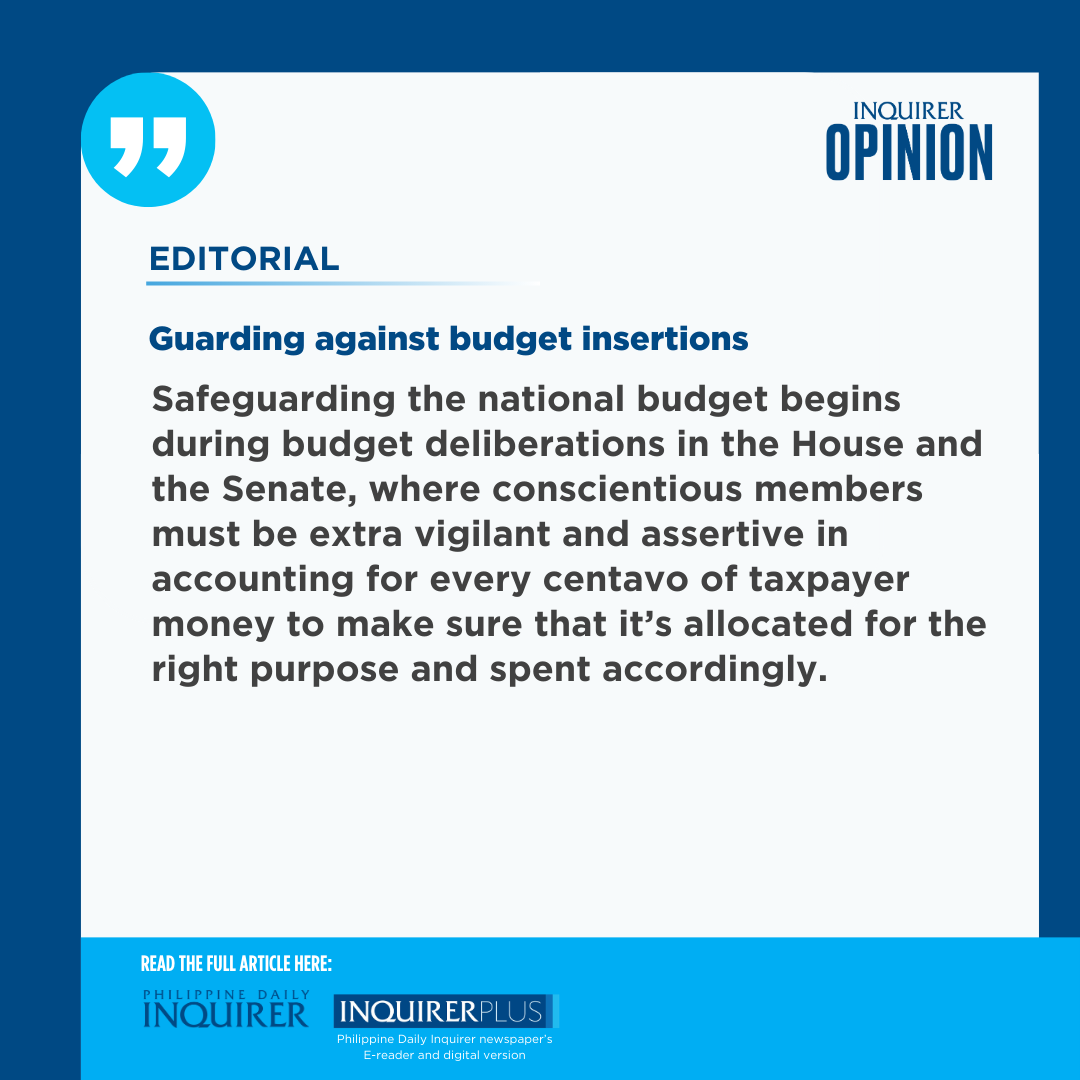Guarding against budget insertions
Sen. Grace Poe is on the right track when she vowed to “keep a watchful eye” on the proposed P6.352-trillion national budget for 2025, particularly on any attempt to bloat unprogrammed appropriations as some legislators might introduce questionable insertions during deliberations.
Poe, the new chair of the Senate finance committee, started panel deliberations on Monday on the 2025 national expenditure plan approved by President Marcos, with a reminder to Secretary Amenah Pangandaman of the Department of Budget and Management (DBM) that taxpayer money should not be spent on items that have no specific funding sources, or are not included in the proposed budget.
Article continues after this advertisementMalacañang, Poe noted, has allotted P158.67 billion for unprogrammed appropriations for next year, a drastic decrease from last year’s P731.4 billion, but still a huge outlay.
The unprogrammed funds are now at the center of controversy amid a case filed by several groups before the Supreme Court, following a Department of Finance’s (DOF) circular requiring government-owned and -controlled corporations (GOCCs) to revert unused funds to the treasury for other budget items and government projects. The petition before the high court protested the return of Philippine Health Insurance Corp.’s (PhilHealth) P89.9 billion in unused government subsidy to the national treasury.
‘Rider’ inserted by Congress
Senate Minority Leader Aquilino “Koko” Pimentel III and health advocates have challenged the constitutionality of DOF Circular No. 003-2024, and the provision in the General Appropriations Act of 2024 that allows the return of excess reserve funds, as they pointed out that the provision was only a “rider” inserted by Congress in this year’s budget.
Article continues after this advertisementSuch last-minute change makes it imperative to closely scrutinize the national budget, especially since lawmakers have been known to juggle budget items during deliberations, and especially when they reach the bicameral conference committee.
This was apparent in the unprogrammed appropriations in the 2024 budget that nearly tripled the DBM’s proposed P281.9 billion after the bicameral conference committee added P450 billion, Pimentel noted. He added that while not requested by Malacañang, the Department of Social Welfare and Development’s (DSWD) P26.7 billion allocation for Ayuda para sa Kapos ang Kita Program or Akap still “found its way” to the current budget. Poe assured Pimentel that she would ensure no such sudden insertions are made in the bicam.
Indeed, it is part of Poe’s mandate and that of other independent-minded senators and House members to do their best to prevent behind-the-scenes machinations that would expose taxpayer money to wanton and wasteful spending by unscrupulous lawmakers.
Herculean task
The realignment of programmed funds to some shameless lawmakers’ pet projects must be exposed to prevent the unreasonable bloating of the budget, that is now being remedied by sequestering funds from PhilHealth and other GOCCs.
While the Supreme Court had abolished and banned the allocation of congressional pork barrel funds, some lawmakers have skirted this prohibition by funneling funds to projects under the Department of Public Works and Highways and other government agencies. These are often projects identified by lawmakers and are meant to benefit their districts or constituencies—in aid of their reelection.
Such funds are on top of millions allocated per House member for supposedly “hard” and “soft” projects for their districts, and much bigger amounts for senators who have national constituencies.
For sure, protecting the national budget from potential misuse and corruption is a herculean task, especially in an election year when our politicians would do everything to curry favor from voters—mainly through public funds.
Third chamber
But let’s be clear: the intense scrutiny on the billions allocated for “ayuda” or cash aid for the poorest families is not meant to prevent government support much needed by these beneficiaries. It is meant to ensure that the funds are not used by politicians to buff their image, nor pocketed by corrupt officials.
For 2025, P591.8 billion has been earmarked for various government cash aid programs for the poor, including P114.2 billion for the DSWD’s conditional cash transfer or Pantawid Pamilyang Pilipino Program.
Safeguarding the national budget begins during budget deliberations in the House and the Senate, where conscientious members must be extra vigilant and assertive in accounting for every centavo of taxpayer money to make sure that it’s allocated for the right purpose and spent accordingly.
Arbitrary changes to the final budget measure by the bicameral conference committee—dubbed the third chamber for making such changes—must not be allowed to subvert the entire process and transform the national budget into an unwarranted pork barrel fund or campaign kitty.
This is a huge challenge that Poe, Pimentel, or Sen. Risa Hontiveros cannot do alone; they need the help of upright colleagues and a vigilant public to succeed.

















